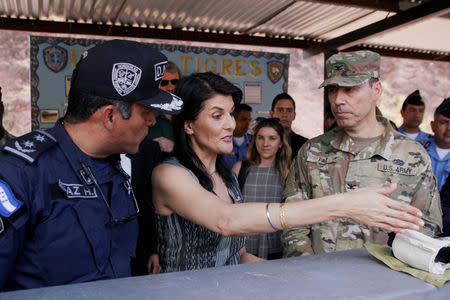In Honduras, U.S. envoy Haley tempers Trump threat over drug trafficking
By Michelle Nichols TEGUCIGALPA (Reuters) - U.S. Ambassador to the United Nations Nikki Haley pledged on Tuesday to raise the problem of drug trafficking at the United Nations after visiting Honduras and Guatemala this week and appeared to finesse a threat made by President Donald Trump to cut aid over the flow of drugs into the United States. Trump this month criticized countries he did not name for "pouring drugs" into the United States and called for aid to be stopped. Trump made his remarks after a U.S. Customs and Border Protection official told him cocaine was mainly coming from Colombia and Peru, through Mexico and Central America. "It's everywhere and everyone's feeling it," said the usually tough-talking Haley, a former South Carolina governor, while in the Honduran capital Tegucigalpa on Tuesday. "It is a conversation that needs to be taking place internationally," Haley said. "We can't just focus on the countries producing it, we do have to focus on the countries moving it and are we doing enough in the international community to stop it." She said Hernandez did not mention Trump's remarks about drug trafficking during their meeting. As a high-profile cabinet member - in a role that has traditionally been shadowed by the secretary of state - Haley's first visit to Central America is also shedding light on U.S. foreign policy for the second year of Trump's administration. "This is the year of the Americas," Haley told reporters after meeting with Honduran President Juan Orlando Hernandez. "You will see multiple members of the president's cabinet making visits to Latin America to really talk about ... what else we can be doing and how else we can be partnering." Her trip follows a visit by Secretary of State Rex Tillerson to Peru and Colombia earlier this month. VISIT SPARKS PROTESTS After Haley left Honduras on Tuesday, around 500 opposition protesters threw rocks at civil and military police near the U.S. embassy. Security forces responded by firing tear gas to disperse the crowd of protesters. Conservative Hernandez beat his center-left rival, Salvador Nasralla, in a Nov. 26 election marred by allegations of fraud, sparking deadly protests. Nasralla, a sportscaster and game show host, and his ally Manuel Zelaya, a former leftist president who was overthrown in a 2009 coup, led the protesters on Tuesday. "The United States is backing a dictatorship in Honduras," Zelaya said in a speech. Haley earlier on Tuesday said the people of Honduras needed to come together in the wake of the election and stressed to Hernandez the importance of electoral reform and human rights. She also praised Hernandez - and plans to do the same with Guatemalan President Jimmy Morales on Wednesday - for their opposition to a U.N. General Assembly resolution in December that called for Washington to drop its recognition of Jerusalem as Israel's capital. "That was one that was not an easy decision for any country to have to vote on. But the people of Honduras stood with us in being able to make that decision for ourselves," Haley told reporters as Hernandez stood beside her. Guatemala and Honduras were among eight countries - and the only nations in the Americas - to vote no with the United States to reject the U.N. resolution, which was adopted with the support of more than 120 countries. Hernandez said he had not yet decided on whether to move the Honduran embassy to Jerusalem, a move that Guatemala has said it would make. When asked if he expected anything from the United States in return for Honduras support on the issue, he said: "No, not at all, the same treatment as a sovereign nation." (Additional reporting by Gustavo Palencia; editing by Grant McCool)





